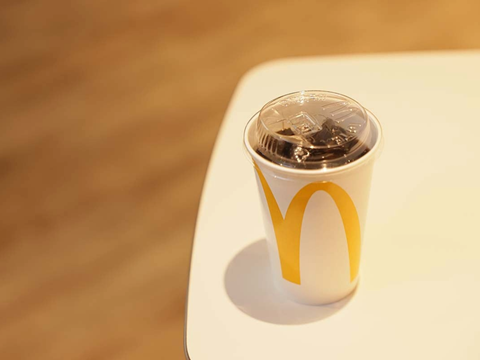
McDonald’s Japan will replace its paper straws with ‘strawless’ rPET lids, transport food in 95% biomass plastic, and pack its Happy Meal toys in FSC-certified paper bags, all in hopes of avoiding 6,600 tons of virgin plastic annually.
By the end of this year, McDonald’s plans to switch all its primary guest packaging to recycled, recyclable, or certified materials internationally. It has been pursuing this goal since 2022 and expects to cut 6,600 tons of virgin plastic out of its operations every year.
The new lids are reportedly made from 100% recycled PET bottles. While they are designed to be easy to open and drink without a straw, the spout is said to avoid leaks and spillages during takeout and delivery – especially for carbonated drinks, which can expel from conventional lids due to pressure build-up in transit.
These lids will be used in all serving options, including in-store, delivery, takeout, and drive-through. Paper straws will be phased out.
Meanwhile, plastic bags made from 95% biomass plastic will be rolled out nationwide. Apparently, these bags offer the same durability and performance as bags made from 50% biomass plastic, and were initially introduced in stores across the Nagasaki Prefecture in May.
McDonald’s Japan urges consumers to avoid using plastic bags unnecessarily and ‘cooperate with us in using simple packaging’.
Additionally, the company is switching up its Happy Meal toy packaging to complements it goal of manufacturing all the products from renewable, recyclable, or certified materials by the end of the year. The previous vinyl packs for its Honno Happy Set picture books have been replaced with FSC-certified paper bags.
This is the latest in a series of revisions to McDonald’s packaging across its national branches. In the United States, the fast food chain has introduced four-flap cups for its Mini McFlurry product; this is hoped to complement its 100% renewable, recycled, or certified materials goal, as well as giving consumers more portion control with small and standard options.
Additionally, independent McDonald’s franchisee Arcos Dorados Holdings has applied J&J Green Paper’s biodegradable, home-compostable, repulpable, and recyclable barrier coating to its paper food packaging. The combination is hoped to help avoid plastics, PFAS, and consumer waste in the fast food sector.
In other news, Sustainability Awards finalist Paramount Planet Product has been nominated under the Pre-Commercialized Climate category for its nano-cellulose straw. This is set to avoid polymeric coatings or composite structures in plastic and coated paper straws, and claims to be biodegradable at end-of-life.
If you liked this story, you might also enjoy:
The ultimate guide to the Packaging and Packaging Waste Regulation in 2025
How are the top brands progressing on packaging sustainability?
Everything you need to know about global packaging sustainability regulation in 2025
The key to increasing the use of reusable packaging in supermarkets














No comments yet